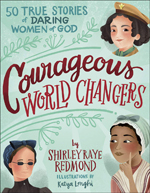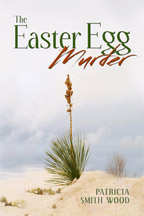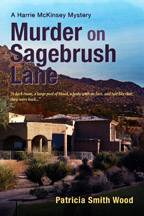Award-winning author Shirley Raye Redmond has published romantic suspense and historical romance novels, over 450 articles, and nearly thirty nonfiction children’s books. Two of her children’s titles have sold more than 200,000 copies each. Her newest nonfiction release is Courageous World Changers: 50 True Stories of Daring Women of God (Harvest House Publishers, 2020). You’ll find Shirley Raye on several websites (ShirleyRayeRedmond.com, StitchesThruTime.blogspot, and WriteChildrensBook.com), as well as on Facebook. For more about her books, read SWW’s 2015 interview and visit her Amazon author page.
 What is your elevator pitch for Courageous World Changers?
What is your elevator pitch for Courageous World Changers?
Faithful Christian women are salt and light in their communities. They all make a difference. But some have such a vibrant faith that—like a stone tossed into a pond— their influence ripples throughout the world. The fifty women included in this book fall into that category.
What unique challenges did this work pose for you?
Some of the women in the book, such as Florence Nightingale and Clara Barton, have been written about so many times already. Many readers, even kids, would suppose they know everything about those women. I wanted to find little known facts about their lives that would make readers say, “Wow, I had no idea she did such-and-such.”
Tells us how the book came together.
The Harvest House editors sparked the initial idea and let literary agents know they were looking for book proposals on the topic. My agent gave me the heads-up and told me to hustle because many other writers wanted to take on the project. I dropped everything to put together my list of 50 women and a couple of profile samples. I was delighted when the publisher made me an offer. I was given 16 weeks to turn in the completed manuscript.
What makes this book unique in the children’s market?
Well, there are many books about gutsy women and even several about spunky Christian women. But I think my list covers a wider ethnic diversity—Chinese, African American, Filipino, Romanian, Dutch, British, and others. I selected women as far back as Catherine of Siena (who was born in 1347) to contemporary women such as Joni Eareckson Tada, who actually wrote a lovely letter thanking me for including her in the book.
Did you discover anything surprising while doing research for Courageous World Changers?
Oh, lots of interesting things! For instance, I had no idea writer Flannery O’Connor made “doll clothes” for her pet chickens. Or that one of the child prostitutes rescued by Josephine Butler in England eventually was placed in the home of Antonia Keville, the daughter of a wealthy British family, who eventually became a midwife, took Holy Orders and became known as Sister Monica Joan—yes, the same Sister Monica Joan in Call the Midwife.
What was your favorite part of putting this project together?
I wanted to find quotations for each woman—something that revealed personality. For instance, on her deathbed, Katharina von Bora said, “I will stick to Christ like a burr to a topcoat.” I think that captures her spunky determination quite well. Harriet Beecher Stowe, while reflecting upon the enormous success of her novel Uncle Tom’s Cabin, said, “The power of fictitious writing, for good as well as for evil, is a thing which ought most seriously be reflected upon.”
What was your first reaction to seeing Katya Longhi’s cover and interior art?
I was delighted with the illustrations. Each portrait is colorful and friendly—I immediately noted all the smiles. And I love how Katya carries the artistic theme over onto the page of text. As the publisher arranged for all the illustrations, I did not know Katya nor was I familiar with her work. She lives in Italy, but we have since become “friends” on Facebook.
In your 2015 interview for SouthWest Writers, you said Patriots in Petticoats, Heroines of the American Revolution (Random House, 2004) was probably your favorite writing project. Courageous World Changers seems to be of a similar theme. What is it about these types of projects that draws you to them?
I love history and the thrill of the chase, digging up nuggets that others may overlook. It has proven to be a lucrative avenue of exploration for me as both of my first nonfiction titles for children were published by Random House and are still in print nearly twenty years later: Tentacles, Tales of the Giant Squid and Lewis & Clark: A Prairie Dog for the President—which became a Children’s Book of the Month club selection when it was first released.
What do beginning writers misunderstand about writing for children?
Many think writing for kids will be easy because the books are shorter. They don’t realize they still need a marketable story plot with character + action + conflict + climax + resolution. Even a nonfiction book like my Pigeon Hero! (Simon & Schuster), which is less than 600 words, still has a story arc.
Also, marketable books for children should tie-in to the school curriculum somehow. At least, that’s been my experience. Courageous World Changers is useful for teachers and librarians looking for something to use during Black History Month, Women’s History Month, Women in Science week, etc. When schools focus on a transportation unit in reading and social studies, teachers and librarians look for novels, picture books, and nonfiction titles about the Oregon Trail, trains, planes, and cars. I once had a lively picture book about Teddy Roosevelt’s reorganization of college football rejected because I’d aimed it at 5 to 8 year olds. The editor pointed out that young children seldom play football and elementary schools don’t sponsor football teams. Even successful fictional stories for kids often have a seasonal tie-in observed during the school year, such as Valentine’s Day or Halloween. When writing for adults, one doesn’t need to keep that sort of thing in mind.
 KL Wagoner (writing as Cate Macabe) is the author of This New Mountain: a memoir of AJ Jackson, private investigator, repossessor, and grandmother. Kathy posts to a speculative fiction blog at klwagoner.com and writes about memoir at ThisNewMountain.com.
KL Wagoner (writing as Cate Macabe) is the author of This New Mountain: a memoir of AJ Jackson, private investigator, repossessor, and grandmother. Kathy posts to a speculative fiction blog at klwagoner.com and writes about memoir at ThisNewMountain.com.










 When the Heart Is Right (Lagan Press, 2019) by Parris Afton Bonds: When Washington D.C. socialite Alessandra O’Quinn is diagnosed with tuberculosis, she must leave everything she knows to seek a cure in the dry desert air of New Mexico. In her new home, Alessandra meets the local Taos Indians and shaman Manuel Mondragon. As she learns how to heal her body, she finds herself fighting to save her true self, as well as her heart. She soon joins the fight against the Bureau of Indian Affairs for the rights to Blue Lake, where the tribe believes their ancient culture was created out of the sacred waters. Set in 1920s New Mexico, this is a story of politics, male domination, racism, and love against all odds. Available on
When the Heart Is Right (Lagan Press, 2019) by Parris Afton Bonds: When Washington D.C. socialite Alessandra O’Quinn is diagnosed with tuberculosis, she must leave everything she knows to seek a cure in the dry desert air of New Mexico. In her new home, Alessandra meets the local Taos Indians and shaman Manuel Mondragon. As she learns how to heal her body, she finds herself fighting to save her true self, as well as her heart. She soon joins the fight against the Bureau of Indian Affairs for the rights to Blue Lake, where the tribe believes their ancient culture was created out of the sacred waters. Set in 1920s New Mexico, this is a story of politics, male domination, racism, and love against all odds. Available on 
























